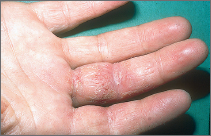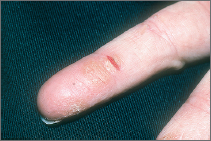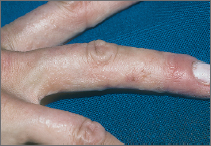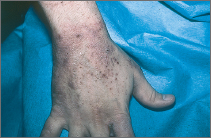A hand rash (eczema) caused by exposure to irritating or allergy-producing substances is called contact dermatitis. This is sometimes called “dishpan hands.”
When there is no evidence of an outside cause for hand eczema, the diagnosis is most likely atopic hand eczema.
Hand eczema
Some people develop a hand rash from overexposure to irritating substances (e.g., hairdressers, cement workers), whereas others develop a contact dermatitis or allergic reaction from allergenic substances (e.g., latex gloves in health care personnel).
Other people who have such hand rashes have inherited this tendency. Often they, or other family members, have a similar problem with their hands. Also, asthma, hay fever, sinus problems, and other allergies tend to run in the family.
Sometimes the eczema may consist of blisters on the fingers or palms that look like little bubbles. This is referred to as dyshidrotic eczema.
Hand eczema
Possibly, patch testing with chemicals or substances that might be the source of the rash may also be used.
Hand eczema
Usually a prescription topical steroid cream or ointment such as ________________ is prescribed to be applied once or twice daily. This medication should not be applied to the face.
Stubborn cases may require covering the medicated preparation with plastic wrap (e.g., Saran Wrap), which is held in place with tape or by wearing vinyl gloves. This helps the medicine penetrate the skin and is left on overnight or for several hours. This occlusion, or wrapping, should only be done under direction of your health care provider. (Occlusion with superpotent topical steroids should not be attempted, unless otherwise directed.)
Topical steroids are safe if used as directed and should be applied only for short periods, if possible, and only against active disease (i.e., with itching and redness).
Use of topical steroids should be stopped when the skin is healed, and the steroids should not be used for prevention of future rashes.
Severe cases are sometimes treated with antibiotics and oral or injectable cortisone.
Other medications that contain no steroids, such as _______________, have been shown to reduce the symptoms and help prevent hand eczema.
Hand eczema caused by atopic dermatitis
If hand eczema is caused by an outside irritant or allergic reaction, those agents should be avoided and eliminated; however, there is no known cure for chronic hand eczema that doesn't have an external cause.
The good news is that there are excellent ways to treat chronic hand eczema, and the condition does seem to get better as people age.
What can be done to help prevent hand eczema?
Use only mild, moisturizing soaps such as Dove or nonsoap cleansers such as Cetaphil Lotion.
Try to avoid using soap on red or itchy skin (many people mistakenly believe that “good soaps” may actually help red, itchy, inflamed skin).
Avoid latex gloves and use protective vinyl gloves at work and at home.
Use protective cotton-lined gloves while washing dishes or performing other similar tasks. Thin, white, cotton gloves come in boxes and are sold in photography stores (for handling negatives).
Use moisturizers liberally (especially in the cold, dry months).
Use self-adhesive bandages (e.g., Band-Aids), which are helpful in healing fissured (cracked) fingers.
Avoid any materials that are known to cause your particular hand dermatitis.



